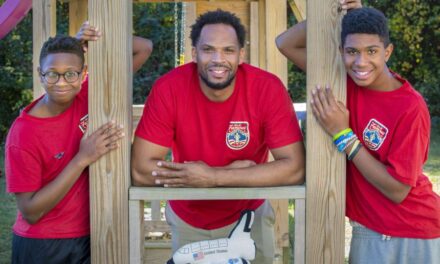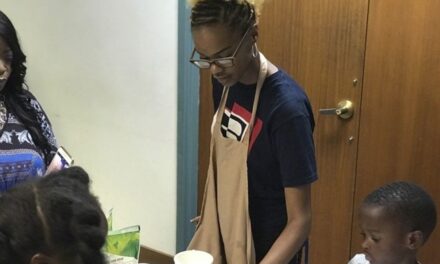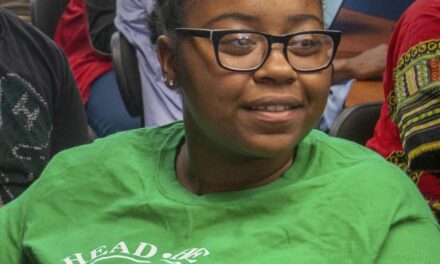Spreading the word
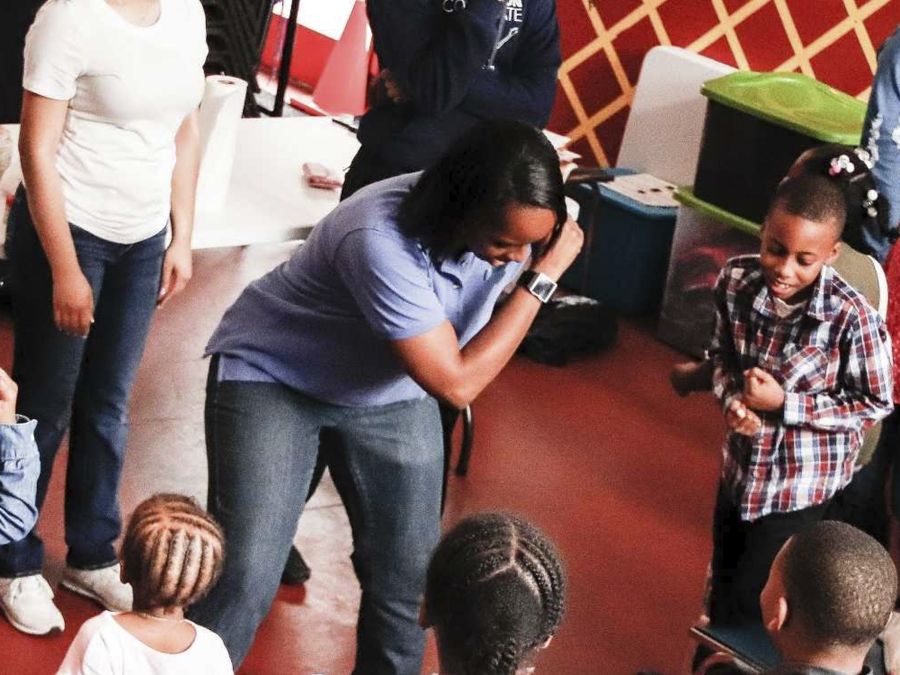
Healthy Habits program helps Halifax County teens teach their peers about nutrition and wellness.
SCOTLAND NECK – Sometimes the best way to reach kids with important information is through other kids. That’s the idea behind 4-H Healthy Habits, a program presented by the National 4-H Council and funded by the Walmart Foundation.
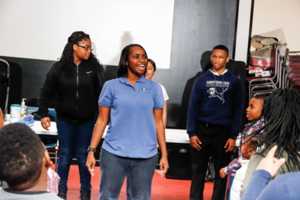
LaTangee Dickens, center, head of the Health and Wellness Ministry at Kingdom Empowerment Ministries (KEM), works with Healthy Habits teen leaders to encourage good nutrition and exercise during a Sunday program in February 2020. KEM’s three Healthy Habits teen leaders have presented 4-H nutrition and health programs to more than 400 youth so far.
For the young people involved in the youth program at Kingdom Empowerment Ministries (KEM) Inc., a ministry headquartered in Scotland Neck with several locations in North Carolina, the method has worked. Since 2018, three teenagers involved in KEM youth programs have taught more than 400 of their peers the basics of nutrition and heathy lifestyles through the Healthy Habits program.
“Many of our kids come from food insecure homes, and we provide a meal to them each week because we realize they aren’t necessarily eating at home,” said LaTangee Dickens, Ph.D., who heads the Health and Wellness Ministry at KEM. When Dickens learned about Healthy Habits through Cooperative Extension at N.C. A&T, her interest was sparked. Some of the kids in the youth program might be interested in participating, she thought, and that could prove beneficial to them and to their peers.
Healthy Habits uses teen mentors to promote healthy eating and physical exercise. Each year, the Walmart Foundation offers funding that is used to train selected teenagers in presenting Cooperative Extension health and nutrition programs such as Teen Cuisine and Kids in the Kitchen. The funding pays for educational supplies and training through Cooperative Extension. For the past four years, Cooperative Extension at N.C. A&T has received Healthy Habits grants totaling $52,000.
After learning about Healthy Habits, Dickens and KEM collaborated successfully with Cooperative Extension at A&T on a Healthy Habits grant proposal. As a result, two teens – Sheniya Bethea, now a 17-year-old rising senior at Nash Rocky Mount Early College High School in Rocky Mount, and Marlecia McNeil, a 15-year-old rising sophomore at Edgecombe Early College High School in Tarboro – completed training on the N.C. A&T campus in Greensboro in late 2018 and began teaching their peers in 2019. Bethea returned to N.C. A&T for more training in 2019, along with a third teen from KEM, Shatonya James, a 16-year-old incoming junior at Hillside High School in Durham. Dickens accompanied the teens to both training programs along with Conechia Morning, team leader of the Vincent Ayinde Morning Sanctuary (VAM) Culinary Ministry at KEM.
The program puts the teen mentors to work teaching their peers about nutrition and health. Its primary goal is to build healthy habits at an early age as a way to combat the high rates of obesity and chronic disease that plague limited-income, minority and rural communities.
“If you want to create healthier communities and healthier future generations, you need to give people skills and knowledge,” said Shewana Hairston-McSwain, coordinator of the Expanded Food and Nutrition Education Program (EFNEP) at Cooperative Extension at N.C. A&T. “This program helps young people develop healthy habits and attitudes about food, nutrition and exercise, and then they share what they’ve learned. It’s a way to build the skills people need to make healthy lifestyle decisions, and it’s also a great leadership experience for the teens.”
Two kinds of learning experiences
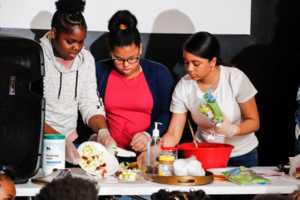
Teen mentor Sheniya Bethea, far right, works with youth at Kingdom Empowerment Ministries (KEM) in Scotland Neck to prepare healthy snacks for the Sunday youth program. Bethea, 17, Marlecia McNeil, 15, and Shatonya James, 16, have been trained as teen mentors through the 4-H Healthy Habits program, funded by the Walmart Foundation and offered through Extension at A&T.
Bethea and McNeil spent the first six months of 2019 presenting Teen Cuisine and Kids in the Kitchen to their peers on Sundays at the VAM at KEM, reaching about 100 young people per class – and sometimes their parents – at four different classes. James, who completed her Healthy Habits training in January 2020, had planned to join them in teaching this spring, but hasn’t had the chance yet because of restrictions on in-person gatherings to prevent the spread of COVID-19.
Dickens credited the success of the teens’ educational programs to having high-quality 4-H nutrition and health curricula to teach and to her colleagues at KEM, who have been strong supporters of the program. Morning mentored the teen leaders and provided guidance as they prepared healthy meals for youth participants at KEM. Additionally, Apostle Emma S. Dickens, senior pastor at KEM, championed the program from the start.
“Our senior pastor really wanted the program here and has been a great supporter,” said Dickens. “She was really ecstatic when kids would run up to her excited and eager to explain what they had learned in Healthy Habits.”
All three teen leaders said they’ve enjoyed two types of learning experiences. First, they’ve gained knowledge about nutrition, cooking and healthy living. Second, they’ve learned how to teach and to overcome their inhibitions about speaking in front of their peers.
“The training really opened my eyes,” said James. “Before, I ate a lot of things that weren’t as good for me as I thought they were. Now, I’ve stopped eating red meat, and I don’t eat chips at all. I just don’t have a taste for them anymore.”
Bethea said she has learned to replace candy with fresh fruit or possibly popcorn when she wants a snack. She also learned the correct way to hold a knife, how to cut an onion without crying, and how to be a teacher.
“Getting up in front of people – that was very different,” said Bethea. “I had to be a real teacher. I had to do a lot of planning and I had to know how to keep them busy for an hour and a half or two hours.”
McNeil said she enjoyed the teaching more than she expected to and sometimes challenged herself to involve students who didn’t seem interested in the educational activities.
“At first, some of them (the students in the classes) didn’t seem that excited, but by the end, when you saw they were enjoying it and asking questions, that was cool. The most rewarding was when we talked about food safety. Some of them would go and tell their parents about it, so you had kids teaching their parents.”
The outcomes from the teens’ experiences teaching Teen Cuisine and Kids in the Kitchen shows teens teaching other teens and younger kids can have a positive impact. Based on surveys of participants, 72% said they now know how to make healthy food choices, 80% said they eat breakfast regularly, 71% pay attention to how much water they drink each day, and 60% pay attention to food labels.
A wealth of new opportunities
The experience has opened up other opportunities for the three youths. James had the opportunity to tour the kitchens at the N.C. A&T College of Agriculture and Environmental Sciences and said N.C. A&T is one of the schools she is considering for continuing her education after high school. She also feels more comfortable speaking in front of groups, a skill that should help her as she moves beyond high school.
Bethea, who hopes to attend either East Carolina University or the University of North Carolina at Chapel Hill, said she is much more conscious of the food she consumes and how it might affect her health.
“I think about that a lot,” she said. “A bad diet can cause a lot of problems, like diabetes, and I want to stay healthy.”
McNeil, who is interested in both art and medicine as possible careers, said she has learned to read food labels carefully and keeps an eye out for ingredients that make foods less healthy, such as sodium, sugar and fat.
Dickens has worked to adapt her church youth programs – which attract young people from all over the region, including some who are not church members – to the realities of the COVID-19 pandemic. She hopes her three teen leaders can get back to teaching their peers, even if the programs are online only.
“Our challenge right now is finding the right avenue to get our kids together safely,” she said. “We are hoping we can start doing things remotely, and we’d like to take what we learned at the January training and share it with the kids.”

